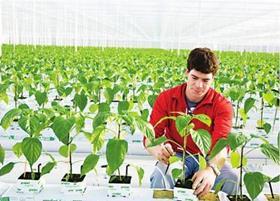

Forward-thinking technologies, including a robotic tomato harvester, have been financed through the government’s latest round of Agri-Tech Catalyst funding.
The government scheme, which rewards collaborative projects tackling the greatest challenges in the agri-tech industry, granted money to initiatives developed by the likes of Thanet Earth, East Malling Research, Tesco and Branston.
The projects – backed by the Department for Business, Innovation and Skills, alongside other agencies and government departments – address issues including food waste, plant disease, weed control and sustainable food production.
Farming Minister George Eustice said: “Although there has been great pressure on farm incomes over the past 12 months, I believe the industry has a good future and technological advances will help.
“Taking innovations from the laboratory to the farm is key to boosting productivity, and tackling pests and diseases.”
Among the 24 financed initiatives, eight were linked to the fresh produce industry. One of these was the Automato Robot venture, which aims to address seasonal labour constraints in the UK and European tomato industry, and their increasing cost.
The cost-effective robotic system, being developed by Sharp Laboratories of Europe, Thanet Growers Eight and several other collaborators, will perform on-crop quality and ripeness inspection, as well as automated harvesting.
The other tomato-related project in the list – designed by Thanet Earth Marketing, East Malling Research and Rail Vision Europe – is a technology for predicting tomato greenhouse production.
The scheme’s aim is to more accurately predict weekly yields and deliver significant savings in import costs and waste that result from under- or over-production.
The team will develop an imaging system, called TomVision, and uses mathematical models, known as PredictTomPro.
The potato industry also received a boost through the funding of strategies, developed by Branston, Tesco and Waitrose, among others, to reduce food waste due to greening in potato tubers.
In the UK, tuber greening costs retailers an estimated £60 million a year, with retailers wasting around 116,000 tonnes of household potatoes. In-field losses due to tuber greening also cost the industry £37 million annually.
Among other projects, support has also been given to develop technology that will help growers monitor and control the storage of British apples – improving their availability window across the year and reducing the need for imports.
The total £16 million investment will help grow the UK’s agri-tech sector – which is worth around £14 billion to the UK economy and employs over half a million people.
The next round of the Agri-Tech Catalyst opened today (14 July) and will focus solely on international development projects.



